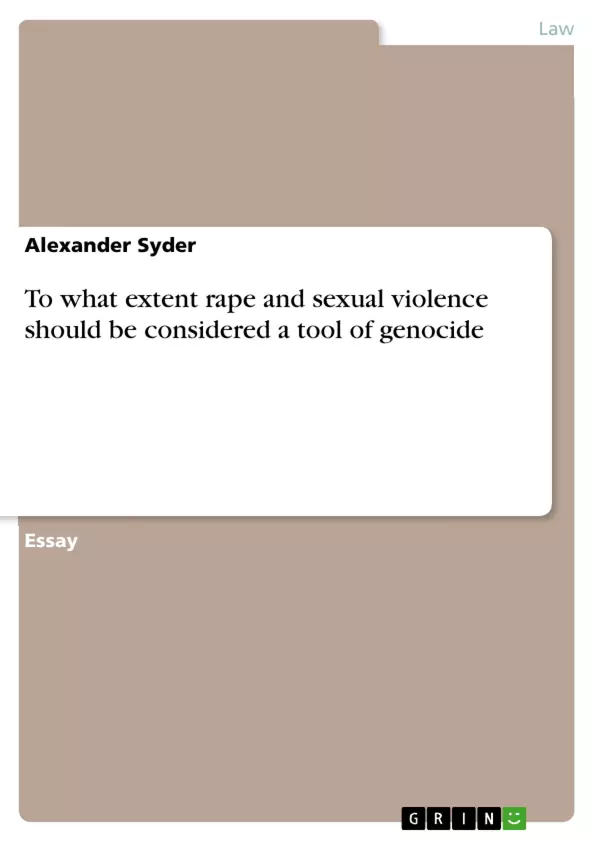Rape and sexual violence do not currently stand as separate crimes under international law; instead they are subsumed into the area of crime such as torture, genocide and the grave breaches of the Genocide Convention. As such international law recognises that rape at the least may accompany acts of Genocide and Crimes against Humanity as a tool of genocide.
The definition of rape as genocide remains hazy, the ICTR and ICTY have interpreted rape in war conflict in various prosecution cases with different interpretations, this may be because that rape as genocide is a ‘recent occurrence within international law’. Rape is also seen as a product of war, a consequence of war rather than a component of war, as it should be interpreted as.
In conflicts such as Bosnia-Herzegovina, Kosovo and Rwanda, rape should be seen as a tool of genocide because of the deliberate intent of destruction as defined by The Convention on the Prevention and Punishment of Genocide 1948, specifically Article II (ICRC, Article II). Rape at the very least demonstrates condition (b) of Article II which stipulates that there has been an act of ‘causing serious bodily or mental harm to members of the group’ (ICRC, Article II). This assertion can be demonstrated in the cases of Rwanda in 1994 and Bosnia-Herzegovina 1990-1994. The emphasis of genocide remains focused on the collective, since there has to be demonstrative proof of intent of destruction of the group not just the individual. Rape however is a personal, individual experience and this complicates judicial responses to defining rape as genocide.
Inhaltsverzeichnis (Table of Contents)
- Rape as a Tool of Genocide
- The Definition of Rape as Genocide
- Rape as a Tool of Genocide in Rwanda
- Rape as a Tool of Genocide in Bosnia-Herzegovina
- Rape as a Tool of Genocide: Legal Implications
- Criticisms of Rape as Genocide
- Feminist Perspectives on Rape as Genocide
- The Role of Elites in Rape as Genocide
- Beyond Female Victimization: Rape as a Tool of Genocide
Zielsetzung und Themenschwerpunkte (Objectives and Key Themes)
This text explores the controversial issue of whether rape and sexual violence should be considered a tool of genocide. It examines the legal definitions and interpretations of rape as genocide, focusing on its application in the Rwandan and Bosnian conflicts. The text also addresses the limitations and criticisms of this concept, highlighting the need for a broader understanding of sexual violence in the context of genocide.
- The legal definition and interpretation of rape as genocide
- The role of rape as a tool of genocide in specific conflict situations, particularly Rwanda and Bosnia-Herzegovina
- The limitations and criticisms of the concept of rape as genocide
- The broader societal implications of defining rape as a tool of genocide
- Feminist perspectives and the role of gender in the context of rape and genocide
Zusammenfassung der Kapitel (Chapter Summaries)
- Rape as a Tool of Genocide: This chapter introduces the topic and examines the legal framework surrounding rape and sexual violence in international law, highlighting the absence of a specific crime of rape genocide.
- The Definition of Rape as Genocide: This chapter delves into the complexities of defining rape as genocide, exploring the interpretations of international tribunals and the evolving legal understanding of sexual violence in conflict situations.
- Rape as a Tool of Genocide in Rwanda: This chapter focuses on the Rwandan genocide, providing specific examples of how rape was used as a tool of genocide, including the transmission of HIV and the psychological trauma inflicted on victims.
- Rape as a Tool of Genocide in Bosnia-Herzegovina: This chapter examines the Bosnian conflict, analyzing the systematic use of rape as a weapon of war and its role in subjugating women and targeting specific ethnic groups.
- Rape as a Tool of Genocide: Legal Implications: This chapter explores the legal implications of defining rape as genocide, emphasizing the potential for international intervention and the importance of recognizing this crime as a tool of mass destruction.
Schlüsselwörter (Keywords)
Key themes and concepts explored in this text include rape as genocide, international law, genocide convention, sexual violence, Rwandan genocide, Bosnian conflict, feminist perspectives, systematic intent, power relations, and gender.
Frequently Asked Questions
Is rape considered a separate crime under international law?
Currently, rape and sexual violence are not separate crimes; they are subsumed under categories like torture, genocide, and crimes against humanity.
How was rape used as a tool of genocide in Rwanda?
In Rwanda, rape was used with the deliberate intent to destroy a group, often involving the intentional transmission of HIV and causing severe psychological trauma.
What does Article II of the Genocide Convention stipulate?
Article II defines genocide as acts committed with intent to destroy a group, including "causing serious bodily or mental harm to members of the group."
Why is it difficult to legally define rape as genocide?
Genocide requires proof of intent to destroy a collective group, whereas rape is often viewed as a personal, individual experience, complicating the judicial response.
What was the systematic use of rape in Bosnia-Herzegovina?
In Bosnia, rape was used as a weapon of war to subjugate women and target specific ethnic groups as part of a broader strategy of ethnic cleansing.
- Citar trabajo
- Alexander Syder (Autor), 2014, To what extent rape and sexual violence should be considered a tool of genocide, Múnich, GRIN Verlag, https://www.grin.com/document/367617



